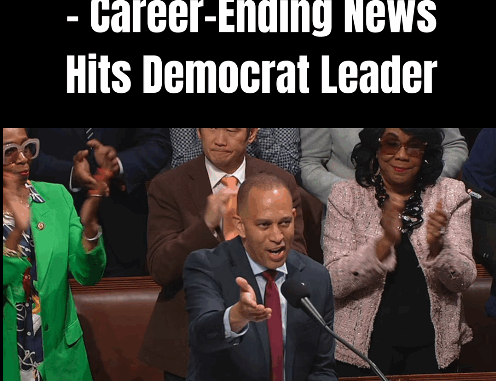
Zohran Mamdani’s democratic socialist allies are reportedly considering primary challenges next year against several congressional Democrats in New York City, including House Minority Leader Hakeem Jeffries.
However, a senior political advisor to Jeffries has vowed that anyone attempting to unseat the top Democrat in the House during next year’s primaries will face a “forceful and unrelenting” response, Fox News is reporting.
Mamdani, the 33-year-old Ugandan-born democratic socialist assemblyman from Queens, sent political shockwaves nationwide with his decisive victory two weeks ago over former New York Gov. Andrew Cuomo and nine other candidates in New York City’s Democratic mayoral primary.

His win marks a significant step toward potentially becoming the city’s first Muslim mayor, but would also signal the Democratic Party’s increasing shift to the extreme far-left.
In the wake of Mamdani’s primary victory in June, the Democratic Socialists of America (DSA) highlighted that “this movement is bigger than one person, election, city, or organization.”
“We encourage all people inspired by the Zohran campaign to join their local DSA or YDSA chapter and get involved so we can continue to fight alongside Zohran and DSA elected officials across the country to create the future we all deserve,” the party added.
Now, following Mamdani’s victory, DSA leaders are reportedly considering mounting primary challenges not only against Jeffries but also other House Democrats representing New York City districts, including Reps. Ritchie Torres, Jerry Nadler, Dan Goldman, and Yvette Clarke, Fox added.
Jeffries, who succeeded longtime House Democratic leader and former Speaker Nancy Pelosi two years ago, has faced criticism from some of New York City’s far-left leaders, who label him a moderate and establishment Democrat.
“His leadership has left a vacuum that organizations like DSA are filling. I think that is more important right now,” New York City’s Democratic Socialists of America chapter co-chair Gustavo Gordillo said in a CNN interview recently.
Democratic socialist state Sen. Jabari Brisport, who represents some of the same areas of Brooklyn that Jeffries does in the U.S. House, told Fox News in a statement that the longtime congressman is “rapidly growing out of touch with an insurgent and growing progressive base within his own district that he should pay more attention to.”
Democratic strategist Andre Richardson, a senior political advisor to Jeffries, highlighted the sweeping actions taken by President Donald Trump during the early months of his second term in the White House that the left vehemently opposes, said, “Leader Hakeem Jeffries is focused on taking back the House from the MAGA extremists who just ripped health care away from millions of Americans.”
Richardson also sent a warning in a statement to CNN against a hard-left primary challenge to Jeffries. “If Team Gentrification [Mamdani allies] wants a primary fight, our response will be forceful and unrelenting. We will teach them and all of their incumbents a painful lesson on June 23, 2026,” he warned.
The tension is escalating as pressure mounts on state and local Democrats in the city to support Mamdani in the general election, amid fears they could face primary challenges if they fail to join his coalition. Mamdani will face Republican Curtis Sliwa in November, while former Governor Andrew Cuomo and incumbent Mayor Eric Adams will appear on the ballot under minor party lines, the New York Post noted.
Brooklyn State Assemblywoman Phara Souffrant Forrest, a DSA member whose district overlaps with Jeffries’ congressional seat, cautioned Jeffries to be careful what he wishes for.“Weird threat to make since Hakeem already went after @JabariBrisport [DSA state senator] and I.How’d that go for him, again?” Forrest said in a statement on X on Thursday.
Democratic Party Faces Major Setback as Voter Registrations Decline Nationwide 
The Democratic Party is facing significant challenges as new data shows a steep decline in voter registrations across the country, while Republicans continue to gain ground. Analysts say the shift could reshape the political landscape heading into future elections.
According to a recent analysis by The New York Times, Democrats have lost more than 2.1 million registered voters over the past four years in the 30 states that record party affiliation. During the same period, Republicans gained about
2.4 million new voters, creating a net advantage of roughly 4.5 million for the GOP since 2020.
“This isn’t a temporary dip — it’s a long-term trend,” said Michael Pruser, director of data science at Decision Desk HQ. “Month after month, the numbers keep shifting, and there’s no sign of it slowing down.”

Key States Show Sharp Turn
The decline is being felt in both battleground states and traditional Democratic strongholds.
North Carolina: Democrats lost over 115,000 voters, while Republicans added more than
140,000, effectively closing a decades-long registration gap.
Pennsylvania & Arizona: Both states saw notable Republican gains paired with Democratic losses.
Nevada: Registered Democrats dropped sharply, signaling growing challenges in a state once considered reliably blue.
New York & California: Even Democratic strongholds have been hit hard, with 305,000 fewer Democrats in New York and an even larger 680,000 decline in California.
Only West Virginia, already a Republican stronghold, recorded larger proportional losses for Democrats.
Shrinking National Advantage
In 2020, Democrats held nearly an 11-point registration advantage over Republicans nationwide. By 2024, that lead had shrunk to just over six points.
Perhaps most troubling for Democratic strategists,
Republicans are now attracting more new voters than Democrats for the first time since 2018. In that year, Democrats captured 34% of new registrations, compared to 20% for Republicans. By 2024, the GOP had pulled ahead, signaling a reversal of momentum. Looking Ahead
Political analysts warn that unless Democrats find ways to reconnect with disaffected voters — particularly in suburban and working-class communities — the party could face even deeper losses in upcoming elections.
“This is not just about the next cycle,” Pruser noted. “If the trend continues, it could reshape the balance of power for a generation.”